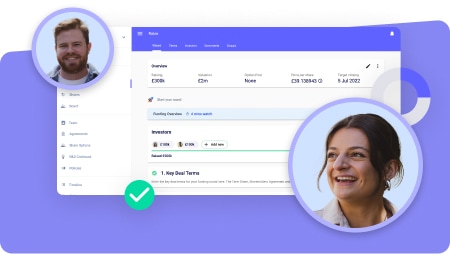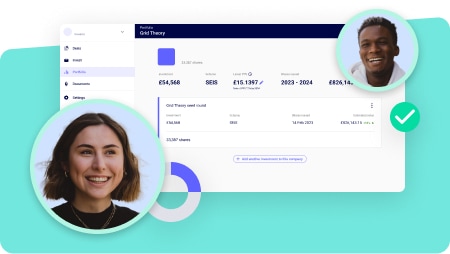Read transcript
Anthony Rose: Hello and welcome to Founder Interviews where I talk to amazing founders. And today I’m talking to Justin from NetZeroNitrogen. You can probably guess what this is about, but Justin, tell us more, tell us about NetZeroNitrogen.
Justin Hughes: So we are developing a biological alternative to synthetic nitrogen fertiliser. So the company exists to eliminate the billion tonnes of CO2 equivalent that synthetic nitrogen fertiliser contributes to greenhouse gases every year. A billion tonnes is more than the whole of global aviation.
Anthony: So I see on the website, a billion tonnes, that’s like 10x or something, all the flights in the world put together. So this is huge problem. So how is a nitrogen fertiliser normally made and how are you changing this?
Justin: So what you normally have is a synthetic product from the Haber-Bosch process, it has a big carbon footprint to production and then it has very low efficacy and usage. Generally with fertiliser, it’s a shotgun approach. You spread it everywhere and hope that some hits the target.
We’re developing a precision sniper approach. We are deliberately placing the fuel, the bacteria, right next to the cells, the engine that needs it within the plant, and the bacteria help the plant get its nitrogen directly from the air rather than from chemicals in the ground.
Anthony: That sounds amazing. So of all the things we talk about on the plant, the carbon reduction seems to be the most significant. So how do you scale? Do you have to build giga factories everywhere? You know, you’re fundraising, you’re raising, I think, four million pounds right now? Do you need hundreds of millions? Tell us a bit more about how this turns into a planet wide thing.
Justin: We’re concentrated a bit more on the cork of our nearest boat, hundreds of millions are further down the road. What we will do in the next period of our next round, the sort of execution is we have the ability to develop the product on a contract basis. So we can use industrial bio-fermentation facilities because it’s a very low density product in comparison to fertiliser. So small volumes. But at some point you’re right, in a future round, we will be looking to own the capacity to build, to actually produce the product ourselves.
Anthony: So what is your progress so far? How many in the team? What are the next steps?
Justin: So it’s been great. We had a pre-seed round last year, we were trying to raise £750k. We were oversubscribed, raised about £1.3 million. And in that period, we have got to a proof of concept field trial where we have replaced fertiliser at different levels in a field in the Philippines. And we saw evidence that we can replace at least 25% of the fertiliser. Saves the farmer about $50 and the environmental saving.
We have an expression of interest from Vietnam’s biggest pesticide distributor, who are talking about 120,000 kilos of offtake. And then we’ve just come second out of 400 in KPMG’s technical innovator of the year competition.
Anthony: That sounds fantastic.
Justin: One, it’s a great product and it works. We’ve proven it in the field. It’s an innovative, disruptive approach and it’s a technical breakthrough.
The team is the team. We have a sort of unusual mix in terms of breadth and depth of genuine scene experience and operations and commercial experience. And the third bit is timing. There are a number of political and environmental tailwinds that are really good for us.
In Vietnam, where we’re focused, the government is running a one million hectares low emission rice programme by 2030 right now. And then over and above all that, it just makes economic sense for the farmer. It’s cheaper, it’s cleaner, and it’s more efficient.
And so, our motivation is environmental, but the biggest lever we can pull is actually economic for the farmer.
Anthony: And it’s the only startup I’ve spoken to that doesn’t mention the word AI, which is great. What got you out of bed one morning to want to solve this?
Justin: It was a bit more insidious than that for me. I’m the only person on the team who’s not a biologist or a PhD in science. And I was introduced by a mutual friend who said the scientists are looking for somebody to help commercialise this. And what I started to see was, you know, there’s not many things cross your radar, across mine, that you can say are genuinely a force for good. There’s something your kids would be excited about and has a bit of legacy. But also it has big numbers attached to it. You know, it’s a huge market that’s ripe for disruption. The combination of impact plus profit, you know, it’s a very exciting opportunity.
Anthony: Of course, everyone wants to do their bit for the planet. This seems like a pretty significant opportunity. So where can people go to find out more?
Justin: So the most obvious place is our website, so it’s NetZeroNitrogen. The website is nzn2.com, n2 being nitrogen.
Anthony: Fantastic, great talking, thank you.
Justin: Thank you.
Synthetic nitrogen fertiliser is a massive contributor to global CO2 emissions—more than the entire aviation industry. It’s inefficient, costly for farmers and harmful for our planet.
NetZeroNitrogen is on a mission to eliminate a billion tonnes of CO2 with their natural alternative to synthetic fertilisers that is highly effective, sustainable and makes just as much economic sense for farmers as it does for the environment. And the company is already seeing real results, reducing fertiliser use by 25% in field trials and raising £1.3 million to scale up their impact.
SeedLegals Co-Founder and CEO, Anthony Rose, sat down with NetZeroNitrogen’s CEO, Justin Hughes, to find out how they’re tackling one of agriculture’s biggest challenges, their journey so far, and what’s next for the company as they scale towards a global solution.
Key takeaways
The environmental challenge
- Synthetic nitrogen fertilisers release over a billion tonnes of CO2 annually, more than all global flights combined.
- Current fertiliser methods are inefficient, with most of the chemicals missing the target and contributing to environmental damage.
NetZeroNitrogen’s solution
- NetZeroNitrogen uses bacteria to help plants get nitrogen directly from the air, cutting out the need for synthetic fertilisers.
- This precision method is more targeted, delivering nutrients exactly where they’re needed.
- Field trials show a 25% reduction in fertiliser use, saving farmers money and significantly reducing emissions.
Scaling and future potential
- The company raised £1.3 million in a pre-seed round, exceeding their initial target.
- Partnerships with major distributors, like Vietnam’s largest pesticide distributor, are setting the stage for global expansion.
- By reducing costs for farmers and offering a sustainable alternative, NetZeroNitrogen is gearing up for large-scale impact.


















